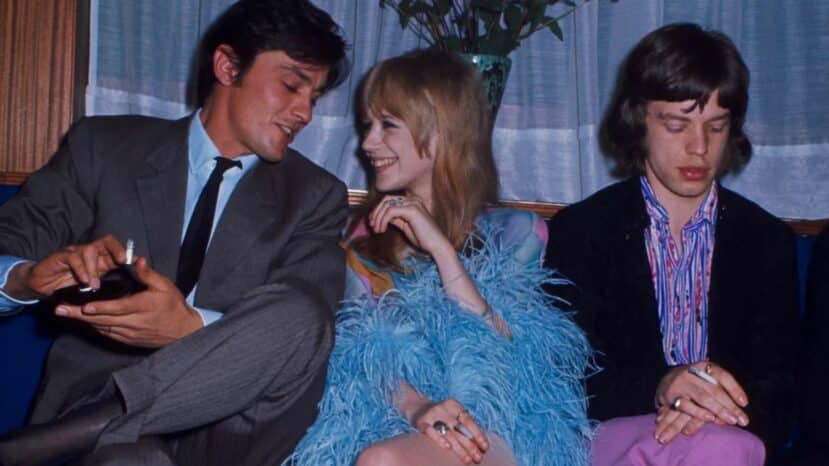Marianne Faithfull: A rock star dies, a legend lives on

Marianne Faithfull, iconic figure of British rock and privileged witness to the Swinging Sixties, has passed away at the age of 78. Her career, marked by fame, excess and extraordinary resilience, leaves behind a priceless musical and cultural legacy.
A dazzling debut in Swinging London
Born in London on December 29, 1946, Marianne Faithfull grew up in a family where art and culture played a central role. Her mother, Eva, from an Austrian aristocratic line, taught dance, while her father, Robert Glynn Faithfull, was a former MI6 spy turned writer.
Marianne’s life changed in her teens when she was spotted by Andrew Loog Oldham, producer of the Rolling Stones. He introduced her to Mick Jagger and Keith Richards, who offered her her first song, As Tears Go By (1964). It was an immediate success, propelling the young singer to the top of the Swinging London charts. Her beauty, charisma and crystal-clear voice made her an icon to be reckoned with.
She went on to score a string of hits with Summer Nights, This Little Bird and Come and Stay With Me. But Marianne Faithfull didn’t limit herself to music: the cinema also coveted her. She made her big-screen debut with Jean-Luc Godard(Made in USA, 1967), then starred opposite Alain Delon in La Motocyclette (1968).
A whirlwind romance with Mick Jagger
Her relationship with Mick Jagger, which began in 1966, became one of rock’n’roll’s most emblematic. Together, they formed a glamorous and sultry couple, inseparable from the Rolling Stones. But behind this seemingly perfect idyll, Marianne gradually descended into drug excess.
Away from the spotlight, their relationship was marked by personal tragedies, including a miscarriage that plunged her into deep distress. At the same time, her acting career took a turn for the better with her role asOphelia in Hamlet (1969), but Mick Jagger did not take kindly to her rise to fame. In her autobiography Memoirs, Dreams and Reflections (2007), she confided:
“Mick wanted me to be his companion, but my career was going to interfere with the image he wanted to create. I stopped working… and plunged into drug hell.”
The hell of addiction and the descent into hell
Cocaine, then heroin, became part of her daily life. In 1971, an overdose in Australia put an abrupt end to her relationship with Mick Jagger. She left the glitz of luxury hotels for a chaotic existence, living on the streets for two years.
Despite this wandering, she continues to inspire the Rolling Stones. Songs like Wild Horses and Sister Morphine are directly linked to their passionate and destructive relationship. But it wasn’t until 1979 that Marianne Faithfull made a stunning comeback with Broken English, an acclaimed album that marked a turning point in her career. Her voice, now rocky, betrays her years of suffering, but gives it a unique intensity.
Artistic revival and belated recognition
After surviving the excesses of the 1970s, Marianne Faithfull was artistically reborn in the 1980s and 1990s. She recorded more introspective albums such as Strange Weather (1987) and Vagabond Ways (1999), collaborating with artists such as Nick Cave, Jarvis Cocker and Cat Power.
At the dawn of the 2000s, she gave a poignant account of her tormented life in Memoirs, Dreams and Reflections, in which she recounts her struggles with drugs, illness and disillusionment. In 2006, she was struck down by breast cancer, but managed to beat the disease.
In the fashion world, she maintains close links with figures such as Kate Moss, Donatella Versace and Karl Lagerfeld, who regard her as a timeless icon.
A final battle against illness and an indelible legacy
In 2020, Marianne Faithfull contracted Covid-19, an ordeal that seriously weakened her health. Despite this, she continues to work and record, determined to leave her musical mark until the end. Her latest studio album, Negative Capability (2018), is critically acclaimed.
Aware of the impact she had on several generations of artists, a tribute album entitled The Faithful: A Tribute to Marianne Faithfull was recorded by renowned musicians such as Iggy Pop and Shirley Manson.
As an epitaph, she confided in 2023:
“It took me a long time to be recognized as the artist I am. But I’ve never stopped believing in my work and in myself.”
On January 30, 2024, the world learned of her death at the age of 78. Marianne Faithfull was gone, leaving behind a body of work marked by passion, rebellion and authenticity.
An immortal legend
Behind her image as the muse of the Swinging Sixties, Marianne Faithfull was much more than an it-girl. She was a complete artist, a survivor, a singular voice that spanned the ages without ever denying itself.
Also read: “A Complete Unknown”: a journey into the skin of Bob Dylan




